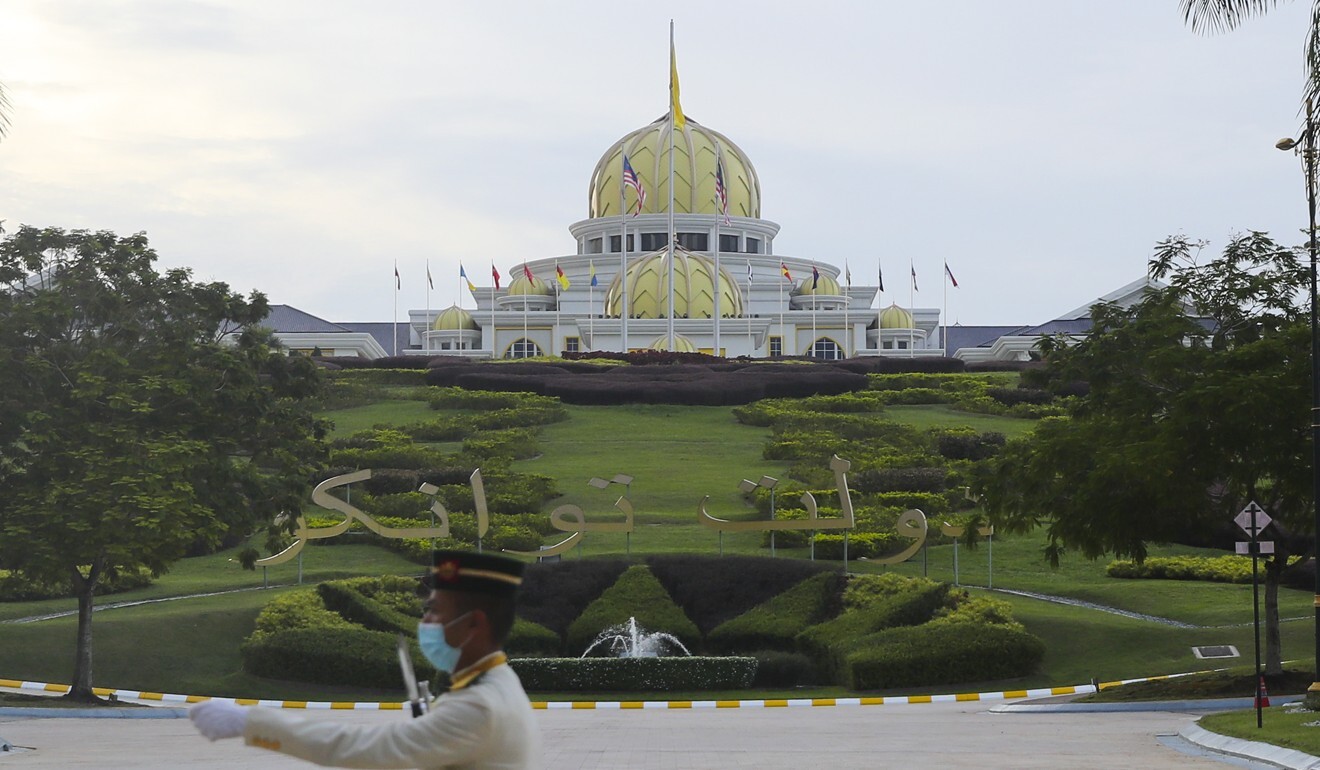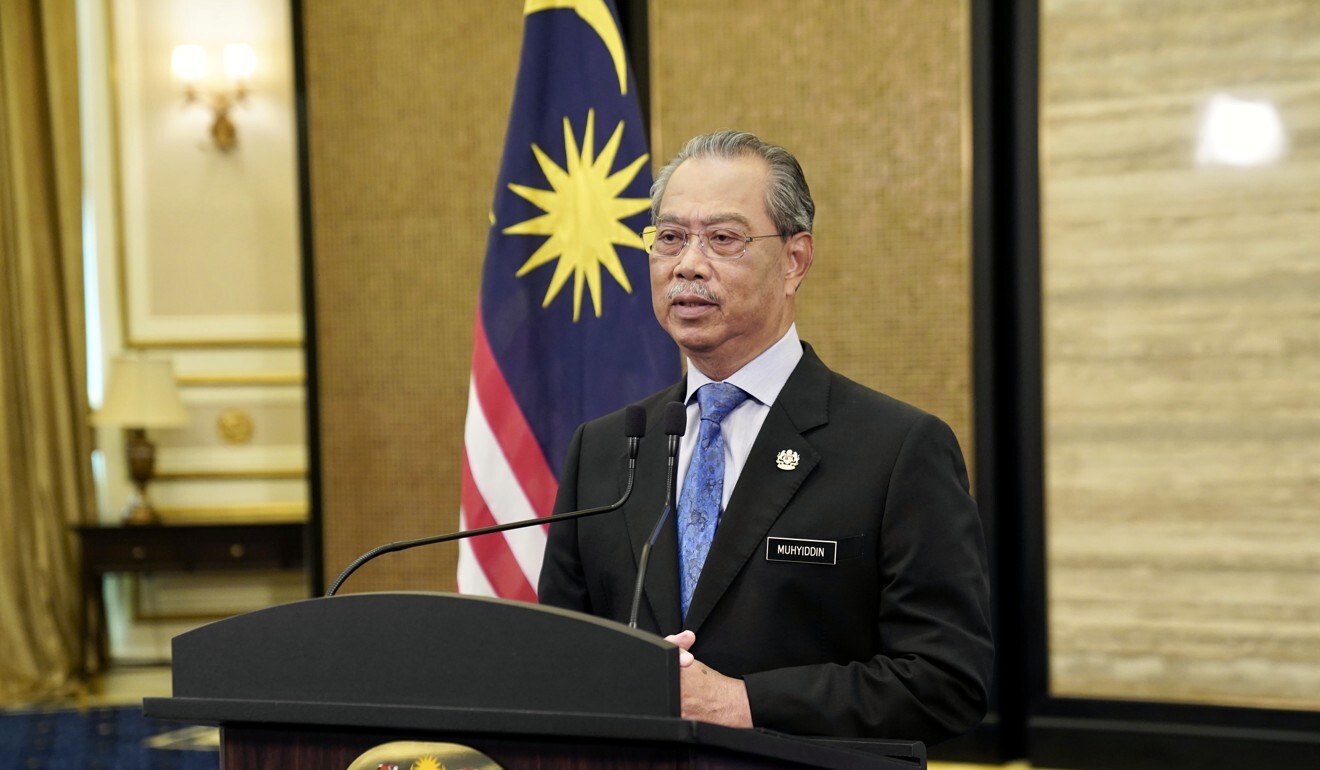
It’s time Malaysia had a law against party-hopping
- Politicking was supposed to be suspended during the coronavirus state of emergency. Instead, MPs are crossing over like it’s a game of musical chairs
- Left unaddressed, this practice will lead to apathy among voters and risks normalising betrayal and dishonour among holders of political office

When Malaysia’s King Sultan Abdullah Ahmad Shah declared a state of emergency in January, his message to the MPs was unequivocal: cut the politicking and focus on tackling the Covid-19 pandemic.
Yet MPs from the Perikatan Nasional government and the Pakatan Harapan opposition did exactly the reverse, soliciting defections to boost their parliamentary support. While Covid-19 infection rates continue to rise, politicians’ power-grabbing behaviour may have a deep impact on the country’s political culture.
Hours before the king declared the emergency on January 12, Umno MP Ahmad Jazlan Yaacob withdrew his support for Prime Minister Muhyiddin Yassin. His withdrawal left Malaysia with a hung parliament of 110 MPs from each side. The parliament has a total of 222 seats, but since two MPs had passed on leaving their seats vacant, the tally was brought to 220. Umno is the largest party in the Perikatan Nasional government but has been playing second fiddle to the prime minister’s party Bersatu . Some Umno leaders feel frustrated for having been passed over for key positions in the Cabinet, including the deputy prime minister post.
Hours after the emergency declaration, another Umno leader Nazri Aziz withdrew his support. In fact, Nazri was the third Umno MP to do so in quick succession. Veteran Umno leader Tengku Razaleigh Hamzah had stopped supporting Perikatan Nasional during the budget vote in December 2020. Had the emergency not been declared, and parliament been convened, Muhyiddin would have lost his parliamentary majority, and that could also have meant Anwar Ibrahim becoming Malaysia’s ninth prime minister. In September, Anwar confidently claimed he had a strong, formidable majority to form the government.

Recently, a statement from the palace said parliament could resume even during the emergency period. Details of what such sittings can achieve, or whether these can deliberate, block or pass government bills remain wanting. The truth is that even when parliament was not in session, politicking continued.
The latest crossovers came from the opposition to the government, boosting Muhyiddin’s administration. The prime minister, photographed with opposition MPs Larry Sng and Steven Choong, declared that he had obtained statutory declarations of support from them.
Until the next election is called, this political game of musical chairs will continue. The prime minister has promised that as soon as the pandemic stabilises, an election will be called, although this is likely to happen after August, when the emergency expires. This also depends on whether the prime minister can firm up his coalition. Right now, constant crossovers are making coalitions fluid, as cracks exist both between and within parties. For example, there are numerous factions in Umno: some support the prime minister, others prefer the party to go it alone; and some show signs of being open to collaborating with the opposition.
MPs claim this game of musical chairs is needed to honour the mandate the people gave them in May 2018, though many voters would say this is not what they voted for.
The irony is that in 2018 Umno and the Islamic party PAS ran against Pakatan Harapan in three-cornered fights. Umno and PAS lost the contest but have ended up being in power today. Crossovers show only that the MPs are not honouring voters’ decisions. Their defections are not based on disagreements over policies or ideology.

The latest crossovers from the opposition to Perikatan Nasional were justified by the simplistic rhetoric that the Perikatan Nasional government was moving in the “right direction”, yet what exactly this “direction” is in terms of policy was not mentioned. Also not mentioned was what the opposition had done wrong, to trigger the resignations.
Moreover, crossovers have become normalised, with the practice now seen as part and parcel of the country’s political culture.
The opposition is not without blame. As soon as Pakatan Harapan won power in 2018, then Prime Minister Mahathir Mohamad accepted a number of turncoats from Umno into his party. Other party leaders in the government at the time, including Anwar Ibrahim of PKR and Lim Guan Eng of the DAP, seemed neutral about it. Now that defections are happening more regularly, the only solution is to enact party hopping legislation.
In the long run, crossovers may lead to political apathy among citizens, as voters will no longer be able to use democratic and electoral means to send their messages to their leaders. Theoretically, they can vote their representatives out if they no longer epitomise their aspirations. If this channel fails, voters may be pushed to consider other means to make their voices heard. This may have the effect of continuous tension between the people and political office holders. The bigger worry is that betrayal, and leaders dishonouring promises, will become so entrenched that it trickles down to the everyday level. As the saying goes, ‘like father like son’. It is imperative that leaders show good moral qualities that will not only revive respect from the current generation, but will ensure history remembers them in a positive light.
Norshahril Saat is Senior Fellow at the ISEAS-Yusof Ishak Institute. He coordinates the Regional, Social and Cultural Studies programme at the Institute